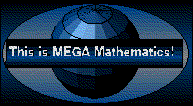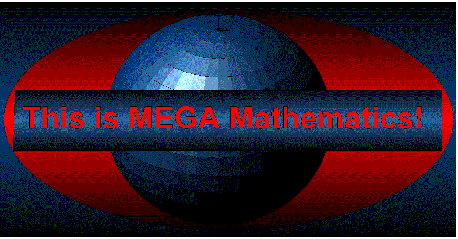


Mathematics is a live science with new discoveries being made every day. The frontier of mathematics is an exciting place, where mathematicians experiment and play with creative and imaginative ideas. Many of these ideas are accessible to young children. Others (infinity is a good example) are ideas that have already piqued many children's curiosity, but their profound mathematical importance is not widely known or understood. The MegaMathematics project is intended to bring unusual and important mathematical ideas to elementary school classrooms so that young people and their teachers can think about them together.
If you've never seen these math topics before, don't be surprised.
Most people don't think of mathematics as a live science where new discoveries are being made every day, yet it is. The traditional school mathematics curriculum seldom exposes you or your students to topics and material that mathematicians find stimulating and exciting. We have chosen such topics for This is MegaMathematics!
We hope that you and your students can acquire a sense of the broad range of content in the field of mathematics. It is true that mathematics is practical, but it is also imaginative and creative. Mathematicians have fun doing what they do because they are experimenting with new things. Professional mathematicians don't struggle to find correct answers to problems someone else has already solved. They are too busy trying to find the answers to the amazing questions that pop into their heads when they think about unsolved, cutting-edge problems.
These materials have been designed with the assumption that you have had little or no experience with the mathematical topics contained in them. Although most of these topics don't make their way into the traditional mathematics curriculum until graduate school, they are completely accessible to inexperienced mathematicians when they are presented without inscrutable notation and arcane vocabulary. We have left the inscrutable notation out, and defined the arcane vocabulary in the section entitled Ideas, Concepts and Definitions.
We suggest that you approach these topics with your students in a spirit of mutual discovery. Browse through the materials. Look at the pictures, read the stories and begin to get a feel for what you find appealing. Ask questions like, "What do we observe?" and "What can we predict?" Together you and your students will be doing what mathematicians do by simply exploring the unknown and seeing what you can find out.
Each topic is accompanied by background material that you will find useful for seeing the bigger picture. Concepts and terminology that are probably new to you are explained in the section called Ideas, Concepts and Definitions. These unfamiliar words and ideas appear in the text as hyperlinks so that you can click on them and get more information.
This is MegaMathematics! and its sequel Computer Science Unplugged grew out of frustration with the fact that the mathematics curriculum for elementary school students contains little of what mathematicians actually do.
Children will form their ideas about what mathematical science is (and is not!) from the mathematics to which they are exposed.
Many topics of current interest in mathematics are accessible to young children as stories and games.
This kind of engagement with children is a vital part of modern mathematical science: it is good for kids, and it is good for science, in challenging researchers to get to the heart of their ideas in engaging ways. This is a proven route to new mathematics research horizons

